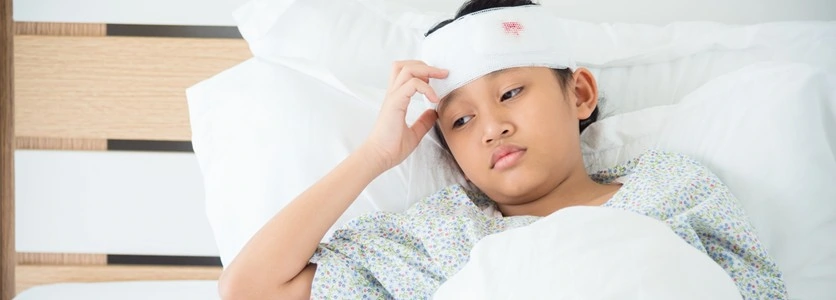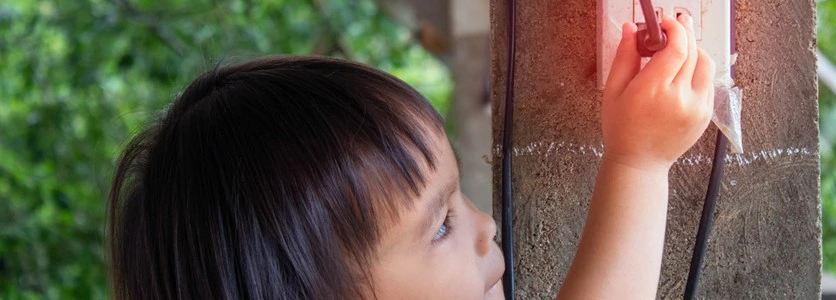10 April 2020
•5 minute read
First Aid Tips For When Your Kid Has An Accident At Home
Knowing what to do in an emergency will help you deal with the situation calmly.
Keeping children confined to the four walls of their home will inevitably make them restless. They may start whizzing about the house, knocking over hot drinks and bumping into furniture (or grandparents). These are undesirable scenarios, but accidents do happen! Columbia Asia regional emergency services coordinator and Consultant emergency physician, Dr Sharonpal Singh, shares emergency measures in the event of a household accident.
Burns
A typical household will have multiple heat sources such as electric irons, hairdryers, electric kettles and of course, the kitchen stove. In the case of a burn, whether it comes from an open flame or hot metal, cool the burnt area under running water. You can use a cool compress to relieve the pain. Remove clothing and constricting items, such as rings or bracelets, from the affected area before swelling sets in. Blisters will develop but do not burst them! They are meant to protect the skin from infection.
If they break by accident, clean the area with mild soap and water. Apply some burn ointment. Do not apply medicated oil, anti-allergy creams or fragranced lotions, and certainly not toothpaste! To provide moisture and relief, you can apply petroleum-based ointment three times a day. Then loosely wrap the burnt area with sterile non-adhesive gauze before seeking medical attention.
Falls
Falls and slips can happen anywhere in the house, from staircases to bathrooms to kitchens. If this happens and the person is responsive, gently move him/her to a safe area. Find out how the fall occurred and if he/she feels any pain. Look for bruises, bumps or any other signs of injury and apply a cold compress over it. If the injury is to the head and the person remains responsive, monitor him/her over 24 hours.
Look out for headaches, vomiting, blurring of vision, weakness, new seizures, drowsiness, and blood or fluid leaking from the nose or ear. If you note any of these symptoms, call 999. In the meantime, do not move him or her until the ambulance arrives. This also applies if the patient is unresponsive immediately after the fall.

Choking
If the person who is choking is able to speak, cry or cough, encourage him/her to cough and spit out the object. Do not try to dig out the object as you may be pushing it even further down the throat. If coughing does not work, hit the patient’s back between the shoulder blades five times by using the heel of your palm. In case the patient is unable to speak or cry, immediately give the back blows mentioned.
If that still does not work, then stand behind the patient and wrap your arms around him/her with clenched fists on his/her belly button area. For obese or pregnant individuals, wrap your hands around their upper abdomen instead. Then, with swift and quick movements, pull the patient inwards and upwards as if you are lifting the patient. Do these abdominal thrusts five times and alternate with back blows for another five times. If this does not work, call 999 for medical direction.
Cuts
Kitchen knives, gardening tools, scissors for arts and crafts; sharp objects in the house are just about everywhere. In the event of a cut, put on a pair of gloves if any, and check to see if there is any embedded object in the wound. If there is, press the sides of the wound to push it out. Wash the wound under running water. Apply and maintain pressure to the wound using a non-adhesive gauze or a clean towel. Dress the wound using a sterile adhesive bandage or gauze. If blood soaks through, add on another layer of dressing on top of the existing one. Rush the patient to the nearest hospital.

Electric shocks
Whether they are old or faulty, electrical items may pose risks of electric shocks especially when cables are exposed. If this happens, do not touch the patient with your bare hands. Switch off the main electrical supply first. Approach the patient when you are very sure that the electrical power has been cut off. If the patient is not breathing, immediately call 999 for medical direction.
Poisoning
Bored little minds may get curious and decide to explore the unlocked medicine cabinet or the cupboard where you store household detergents and cleaning liquids. In case of ingestion, look out for burns or redness around the mouth and lips. The patient’s breath may smell of chemicals. There may be vomiting, difficulty in breathing, drowsiness and confusion. If the patient is alert, do not induce vomiting. Immediately rinse his/her mouth. Keep the product or medicine container to show the doctor later. If the substance has scathed the skin, carefully remove the contaminated clothing and wash the exposed areas with lots of room temperature water.
In the case of chemicals getting into the eye, rinse the eye with a gentle flow of water from a jug for 10 to 15 minutes. Allow the water to flow from the inner corner of the eye to its outer corner. Do not apply eye drops. If the poison is inhaled, from a strong bleach solution for example, the patient will need fresh air immediately. Loosen any tight clothing around the neck. Open all doors and windows. Avoid breathing in the fumes. If the person is unconscious due unknown gases, do not approach as you may be poisoned by the fumes as well. Wait for medical help to arrive.
Bites and stings
Bees, wasps, even household ants can be dangerous especially to someone with sensitive skin or prone to allergic reactions. If you have a history of allergy, reactions can be serious. Symptoms include swelling of the face around the eyes, lips and tongue, breathing difficulties and rashes that are potentially life-threatening. Bring the patient to seek medical help immediately.
Dangerous objects at home
Young children will marvel at just about anything they can get their hands on. Uncommon but extremely dangerous are small flat batteries and medicated patches. Store such items in a locked compartment.
Round, shiny and coin-sized, these flat batteries used in watches and cameras, could come across as sweets. They are very dangerous to small children. A battery stuck in the esophagus can cause severe burns in as little as two hours. If you suspect that a child has swallowed one, immediately take the child to the hospital for an emergency X-ray. Doctor will have to remove the battery as soon as possible.
As for medical patches, these will come across as stickers which the child will want to stick onto the skin or put in the mouth. If you think your child has gotten hold of medicated patches, carefully inspect the child’s skin, and the roof of the mouth in case the child has sucked on them. Remove the patch and small remnants that have stuck to the skin. Rinse with water and seek medical attention.
7 ways to stay safe at home
- Open the windows and doors to let air circulate.
- Clean the house frequently especially areas that are often touched such as doorknobs and light switches.
- Ensure your house has adequate lighting to prevent falls.
- Keep the bathroom dry to avoid slips. If it is a wet bathroom, watch that there are no pools of water. Consider using anti-slip mats or change to anti-slip tiles.
- To avoid drowning incidents, never leave water in a pail or basin unattended. Close the bathroom doors when they are not in use.
- Secondary smoke is just as dangerous as primary smoke. Stop smoking.
- Get rid of mosquito breeding grounds such as containers filled with rainwater.
Share:
Was this article helpful?
10 April 2020
•5 minute read
First Aid Tips For When Your Kid Has An Accident At Home
Articles and Video
Learn more about Internal Medicine And Endocrinology in Columbia Asia
Learn MoreShare:
Was this article helpful?
Health Packages
Elevate your health with tailored health packages at Columbia Asia Hospital. Take charge of your health journey today.

